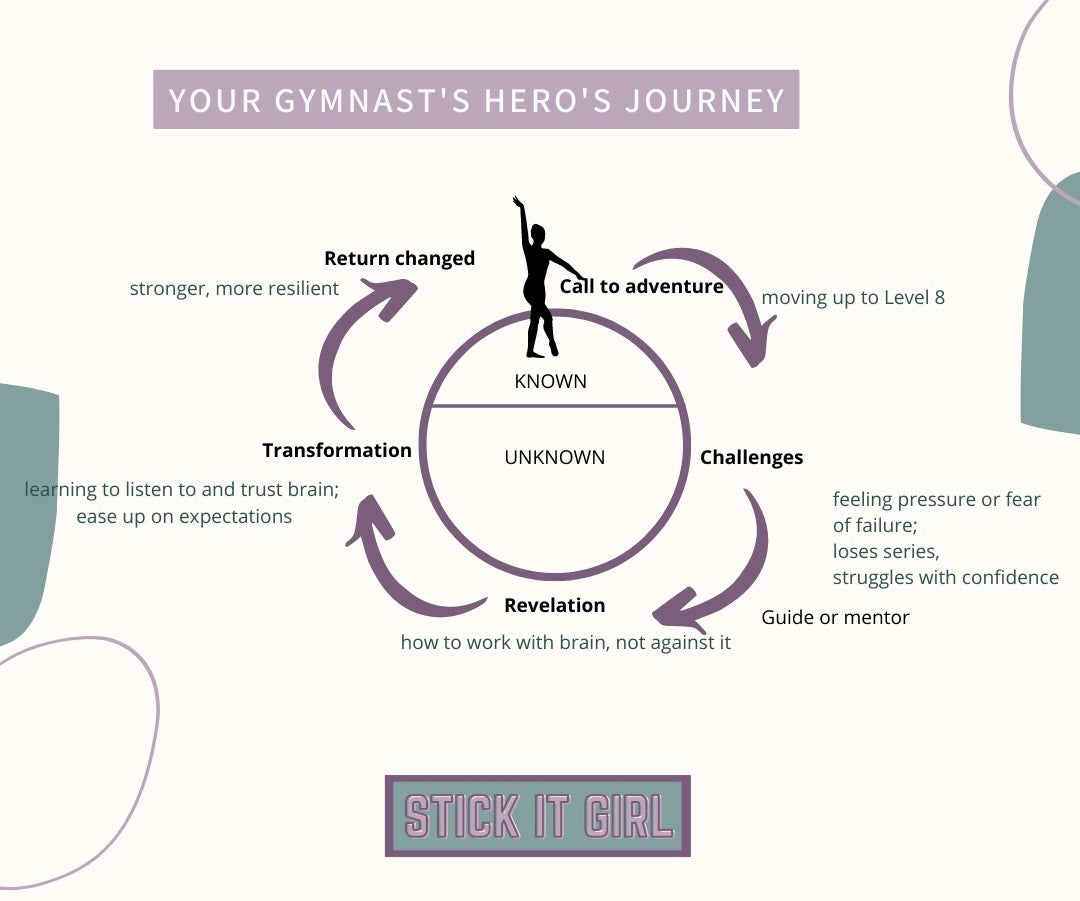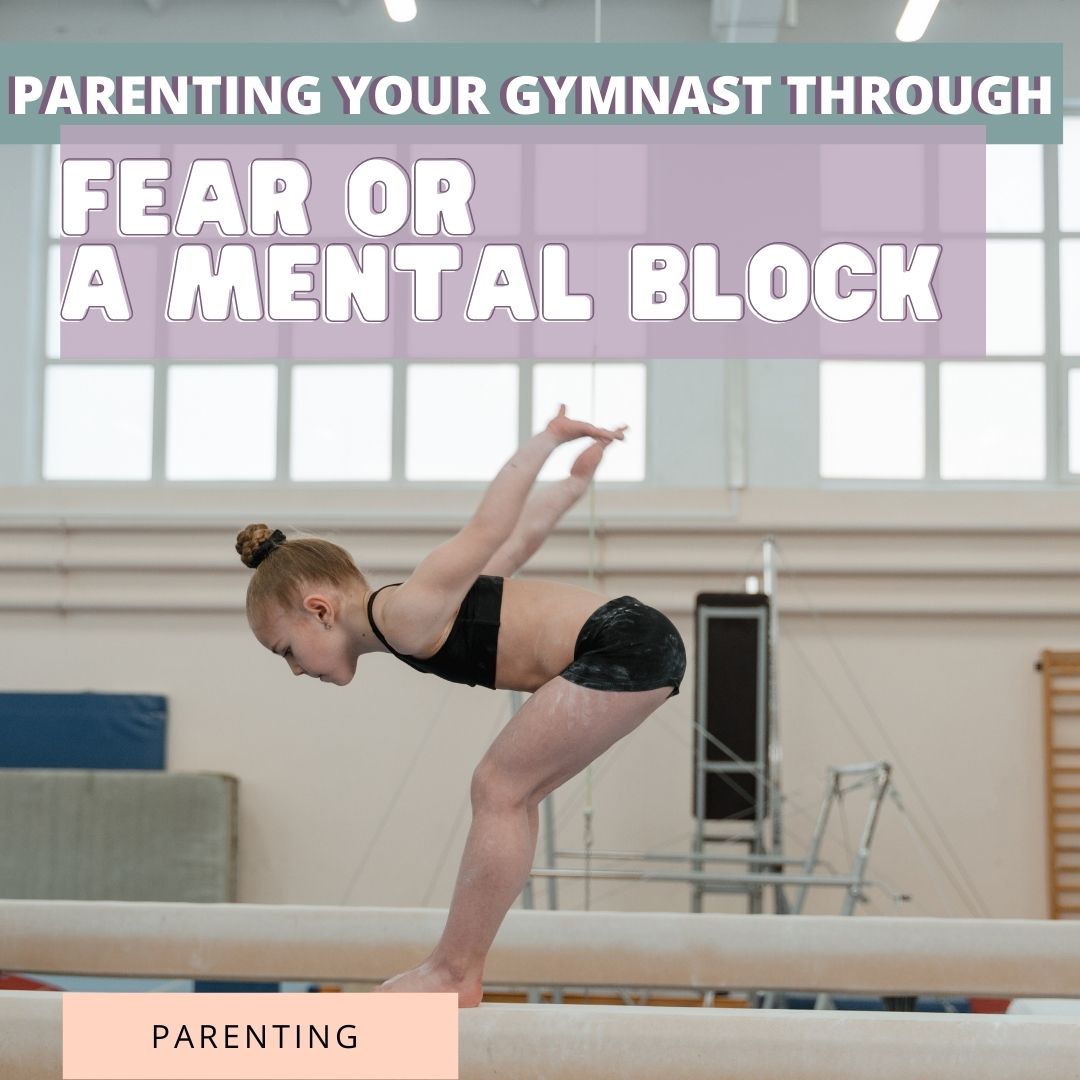
When your gymnast struggles to do a skill in gymnastics either because of fear or a mental block it can be devastating for her, as well as for you as her parent.
Skill loss or fear of a skill can leave a lasting impression on your gymnast’s confidence. She might question her ability to ever do that skill again which might eventually affect her overall confidence and demeanor in the gym.
In turn, it can really tug at your heart strings as a parent who wants to help her and can’t bear to watch your gymnast’s confidence drop or see her lose her joy.
Having worked with many gymnasts going through mental blocks, I know that a mental block can affect everyone involved. Even coaches become frustrated when they feel they can’t help their gymnasts.
As your gymnast loses confidence and becomes a completely different gymnast over the course of her struggle, it makes you scramble to figure out what you can do to make this mental block go away and never come back! And sometimes, let’s face it, you feel totally desperate to do anything that will help.
Below are some tips for how to parent your gymnast through fear or a mental block:
1. Don’t Try To Fix Your Gymnast’s Fear or Mental Block.
Of course, your natural inclination as her parent is probably to “fix” this for her. You want to help her by getting rid of this situation so you can all move forward. One of the biggest things I tell the parents I work with is that there is nothing you need to “fix.” Your gymnast isn’t broken. In fact, it’s the opposite. Her brain is working exactly the way it needs to. She just needs to understand it. When you look at this as a problem that needs to be fixed then your gymnast’s self-esteem takes an even bigger hit.
2. Lay Off The Advice
Along with wanting to fix this situation for her, you become desperate to find the solution. So ultimately most parents offer lots of advice to their gymnasts. You might tell her things to correct or work on in practice. Or you might give her suggestions for how to get through this. While all of this comes from good intentions, it doesn’t help your gymnast. Yes, your gymnast needs help. But she doesn’t need it from you! From you she needs the warm hug and empathetic ear. You are her support system right now. Be there for her to lean on.
3. Be a Listening Ear
When your gymnast gets in the car after practice you might ask her a lot of questions about practice. “Did you do your skill today?” “Did you do what we talked about?” “Did coach help you?” “Was coach mad?” And the questions go on and on. While your intention is to want to find out what happened and help your gymnast, your gymnast will often see this as more of a threat. When she’s already had a rough practice, answering questions about it doesn’t make it better. So instead, practice being a listening ear. If your gymnast starts to talk, really listen to what she’s saying instead of offering solutions or asking more questions.
4. Take Care Of Yourself
Often when parents get wrapped up in their gymnast’s struggles, I see them forget about their own self-care. This journey through fear or a mental block can take a lot out of you and your family. It’s draining and exhausting trying to navigate through it and that means you inevitably put yourself last. You can’t pour from an empty cup so make sure you’re filling up your own cup as often as possible.
5. Visualize Your Gymnast Thriving
When your gymnast is struggling, it’s easy to get stuck in those negative thoughts. But I challenge you to visualize your gymnast thriving in the gym at least one time per day. Imagine her with a smile on her face feeling strong and brave. See her overcoming her fear and beaming with pride and confidence. The more positive energy you can put her way, the more she’ll feel it. When you get in the habit of seeing her as a “victim” of this circumstance, you do a disservice to her. And she feels it. Without realizing it, you treat her very differently when you view her as going through a negative situation as opposed to being someone who can overcome anything that life throws her way.
6. Get Your Gymnast The Help She Needs and Then Take A Step Back
Most coaches aren’t trained in mental blocks or overcoming fear from a sport psychology standpoint so they often hit a wall when it comes to helping your gymnast get through this sort of situation. If you notice that coach is struggling to help your gymnast or that he/she is doing things that are undermining your gymnast’s confidence, it’s time to reach out for the help your gymnast needs. A mental performance coach trained in gymnastics, like myself, can help your gymnast move through her mental block and fear more quickly. While you might hesitate to have your gymnast talk to someone because she’s either shy or reluctant, try it anyway! Your gymnast shouldn’t have to struggle alone. Once you get your gymnast this help, you can take a deep breath and a step back because you are off the hook!
At the end of the day it’s important to remember that your gymnast isn’t a victim and treating her that way won’t help. She’s going through a journey that will forever change her, in a good way. While she might struggle, that’s ok! She won’t get stronger or better without any struggles.
The Hero’s Journey
I recently equated the mental block/fear journey to the Hero’s Journey that our middle school children often learn about in literature. The book Percy Jackson came to mind as I remember helping my oldest child understand Percy’s Hero’s Journey for a school project.
And then it dawned on me that gymnasts go through this journey too!
Here’s my take on it:

Your gymnast is called on a journey. Often it’s to learn a new skill or to move up a level.
Along the way she faces challenges that are hard. She might feel pressure to learn a certain skill (series!) or not want to get left behind while her teammates move on to the next level. Often it is during this time that she’ll go through a mental block or experience fear.
She’ll often call on a guide or someone to help her through it. It might start as her coach but then often turns to someone more experienced in this struggle such as a mental performance coach. This guide then helps her have a revelation where she understands her brain and what’s going on.
In a hero’s journey, this is often when the hero has a near-death experience. Luckily that’s not the case for our gymnasts but often it’s that rock-bottom situation of being unable to compete or that huge dip in confidence.
Eventually, with work and time your gymnast has a transformation and figures out how to work with her brain and move through her fear and/or mental block.
She becomes stronger and resilient and eventually returns “home” a changed person.
While most parts of this journey are uncomfortable and hard (and something she’d rather not go through), the end result is always a positive. She is forever changed in a good way and becomes a stronger, more resilient gymnast.
Use this synopsis as a sign that everything will be alright for your gymnast. You might have to work through the hard and uncomfortable parts but it’s for a good cause. So keep your own chin up and your gymnast will feel your strength and hope.
—–
If you or your gymnast needs support, in addition to the resources below I also offer one-on-one coaching sessions via Zoom including a Mental Block Jumpstart coaching package.
Helpful Links:





